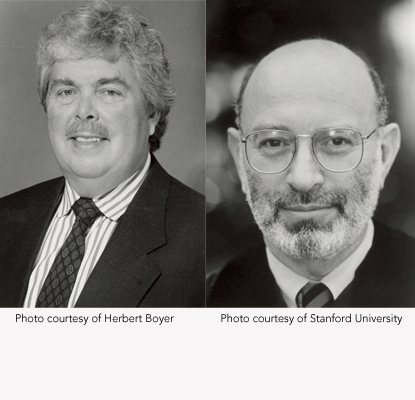Herbert Boyer and Stanley Cohen
Over hot pastrami and corned beef sandwiches, Herbert Boyer and Stanley Cohen opened the door to genetic engineering and laid the foundations for gene therapy and the biotechnology industry. For these outstanding achievements, the two collaborators received the $500,000 Lemelson-MIT Prize in 1996.
Boyer and Cohen met in 1972, while presenting papers in Hawaii at a conference on bacterial plasmids. A Stanford University professor, Cohen had been working on ways to isolate specific genes in antibiotic carrying plasmids and clone them individually through introducing them to E. coli bacteria. Boyer, hailing from the University of California, San Francisco, had discovered a restriction enzyme that cut DNA strands at specific DNA sequences, producing "cohesive ends" that could stick to other pieces of DNA.
Following the conference, the two colleagues met at a local deli to discuss using plasmids as a vector for cloning individual DNA segments. Boyer and Cohen agreed to collaborate, and in a matter of months succeeded in splicing a piece of foreign DNA into a plasmid carrier, which then inserted genetic information into a bacterium. When the bacterium reproduced, it copied the foreign DNA into its offspring, acting as a natural factory producing biological substances.
By genetically engineering cells to produce human substances, Boyer and Cohen invented a quick and easy way to make chemicals like HGH (human growth hormone), synthetic insulin, factor VIII for hemophilia, somatostatin for acromegaly and clot-dissolving agent tissue plasmogen activator (tPA).
Boyer and Cohen have received three patents, from which over 350 licenses have been granted—generating over $20 millionin royalties. Despite their achievements, Cohen modestly declares, "Boyer and I didn't set out to invent genetic engineering. Our invention came from efforts to understand basic biological phenomena and the realization that our findings had important practical applications."
Boyer, from Derry, Pennsylvania, received his BS in biology and chemistry from St. Vincent's (1958) and his MS (1960) and PhD in bacteriology from the University of Pittsburgh (1963), followed by post-graduate work at Yale. In 1966, he was appointed as a professor at the University of California San Francisco. He served as an investigator for the Howard Hughes Medical Institute from 1976-1983, and co-founded the American biotechnology corporation Genentechin 1976, holding the position as Vice President until retiring in 1991.
Cohen, a native of Perth Amboy, New Jersey, received his BA in biological sciences from Rutgers University (1956) and his MD from the University of Pennsylvania (1960).Cohen joined the faculty at Stanford University in 1968 as an Assistant Professor of Medicine and was appointed as a professor of medicine in 1975 and professor of genetics in 1977. He is currently the Kwoh-Ting Li Professor in the School of Medicine, a position he has held since 1993.
Both Boyer and Cohen have received the National Medal of Science and the National Medal of Technology and are members of the National Academy of Sciences.


